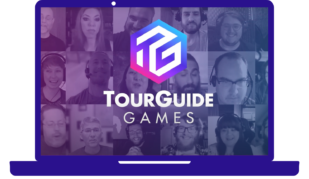You know how when you were a kid, you used to pretend sticks in your backyard were swords and maybe you’d wield those stick-swords to fight imaginary dragons and save the princess? You don’t have to be a kid to play pretend and have a blast with your friends. Tabletop role-playing games — often called TTRPG for short — are a great way to use your imagination and bond over the dinner table. Or, in the middle of a pandemic, you can even play virtually.
But before we talk shop, let’s talk more about the TTRPG game genre itself.

What is a Tabletop RPG?
Remember in Stranger Things where Mike and his friends sat around their table coming up with ways to defeat the Demigorgon? (You know, at least until they found out it was real.)
The game played by the kids in Stranger Things is actually one of the first TTRPGs: Dungeons & Dragons.
All TTRPGs have two things in common: setting and rules. No matter what TTRPG you play, every game takes place somewhere (your “setting”) and operates under a specific system of rules to facilitate roleplaying and storytelling. The premise is simple: you and your fellow players each take on the identity of a different character. These characters work together towards a common goal. These goals can be as straightforward as hunting for treasure, acting as bounty hunters to capture a wanted criminal, or taking down The Big Baddie, whatever it may be. Other goals might be even simpler — survive or be the last person standing — or more complex: you’re a bear at HoneyCon and it’s up to you and your fellow bears to steal a massive jackpot of honey.
More specifically, TTRPG systems are basically a set of parameters to help guide your game. Most of the time, these systems guide who wins in a conflict, how players can interact with their surroundings, and what happens next in the story.
How Do You Play?
The exact mechanics you’ll use depend on which system you decide to use — but most TTRPGs share the same general mechanics no matter what specific game you’re playing:
Player groups first will want to pick their system and game. Next it’s time to decide who will be the game master and who will act as players.
The game master (sometimes referred to as a GM, or in Dungeons & Dragons, DM for “Dungeon Master”) is the rules keeper. The GM guides players through the system, and ensures everyone plays fairly. They’re also responsible for coming up with the plot and playing as Non-Player Characters (or NPCs) that will interact with the players.
Players roleplay only as one character. Doing this allows them to go in detail with their character and add depth to their personality. Once you know how everyone will be interacting with the game, then the game begins!
What Types of Games are Available?
There are literally thousands of different systems and games you could use for TTRPG game night. Here are four basic categories for most TTRPGs
Rules Heavy
Rules Heavy games have one or more full-length books explaining how things work. Dungeons & Dragons is a great example of a Rules Heavy game, since it has dozens of books detailing monsters, the role of the Dungeon Master, different character types, and so on.
Most Rules Heavy games are time intensive, requiring players to spend a ton of time creating and building their characters, from giving them specific stats and personality traits to abilities and back stories.
Rules Light
Rules Light games are a lot more manageable, especially when you’ve never played a TTRPG before. Conflicts, such as fighting monsters or overcoming other obstacles, are resolved quickly and your character usually only has a few stats that determine how you interact with other characters.
One Shot
One Shot RPGs are games you can finish in one sitting. They aren’t specific to Rules Light or Rules Heavy, but don’t follow the long-form, multi-sitting structure (often called campaigns) that many other systems utilize.
Genre Games
No matter what style of game you decide to play, there’s pretty much a system designed for every genre out there. You can explore a fantasy world, solve a mystery as a hard-boiled detective, or even play as a fanatical supervillain mastermind who must outwit their fellow supervillains to take over the world! The great thing about genre games is that, much like the many ways a TTRPG story can play out, the possibilities are endless.
How Can I Get Started with TTRPGs?
One of the easiest ways to get started with TTRPGs is to try out a game with your friends. Your local game or comic shop is likely to offer tabletop game nights if you’re looking for in-person gaming experiences.
If you’re looking for something virtual, check out our selection of game nights: we have several to choose from. You don’t have to know anything about how to play, or even assign someone the giant tasks of both learning a system and coming up with a storyline. TourGuide Games takes care of all of that for you and your friends for an awesome One Shot game night experience.
Now the only question you have to answer is… which game will you try first?



